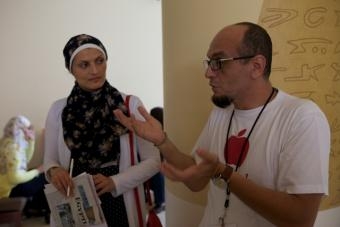In 2016, a select group of journalists from throughout the world joined an online seminar which shared insights, resources and strategies for reporting on religious tensions throughout the world.
“Covering Global Religious Conflict,” a six-week seminar offered by the International Center for Journalists from Oct. 10 to Nov. 18, 2016 critically examined effective ways of reporting on religious conflicts.

The goal was to bring together the most up-to-date research and reporting with a group of dedicated international journalists determined to work together in dialogue to provide fair and accurate coverage of sensitive issues in religion that transcend national boundaries. Together, we have the resources and the on-the-ground experience to provide our audiences with a rich, nuanced understanding of issues from the role of religion in the Arab spring to the sources of civil war in West Africa to the far-reaching effects of the burning of a holy book in Florida.
During the seminar, participants:
- Explored coverage of religious conflict around the world, sharing a wide range of professional approaches.
- Examined up-to-the-minute case studies of religious conflict from the Middle East to West Africa to Europe to the United States. The seminar was flexible in responding to the latest news related to religion demanding the world’s attention. Several examples of international reporting and online conversations challenged participants to become the best in the field in understanding and writing about religious tensions.
- Received objective tools for covering conflict through access to sources and the latest international research. Online tutorials offered step-by-step help to guide reporters to relevant data.
- Explored the political cultural and economic - as well as the religious – reasons for conflicts that are often too narrowly defined in one category. Particular attention was paid to objective indicators of religious freedom.
- Discussed ethical issues in reporting on conflict, from the need to tell all sides of a story to the practical concerns of reporters’ personal and job safety in challenging editorial and cultural attitudes in their own countries.
- Explored the importance of the careful choice of language in describing religious groups and issues.
- Developed collegial partnerships for international reporters to work together.
The course, which was offered in English and Arabic, was designed to be a lasting resource for journalists leading the field in excellence in religion writing and reporting. Several participants also were invited to a conference in Europe early the next year to further work on ways to promote international cooperation in religion journalism.
The seminar was ran by: David Briggs: In 25 years of national and international religion journalism for The Associated Press and metropolitan newspapers, Briggs has been consistently honored among the Top 10 secular religion writers and reporters in North America. In addition to teaching, he writes the Ahead of the Trend column on religion research for the Association of Religion Data Archives, and is often featured on the Huffington Post religion page.
Briggs holds a master’s degree in religion from Yale Divinity School and a bachelor’s degree from the University of Missouri School of Journalism. His work has been published in newspapers throughout the globe, first as a religion writer for The Associated Press, where he was nominated multiple times for a Pulitzer Prize by the world’s largest news service, and then as a religion reporter for the Cleveland Plain Dealer, where his work also was distributed by Religion News Service and Newhouse News Service. He served as president of the Religion News writers Association from 2000-2002.

